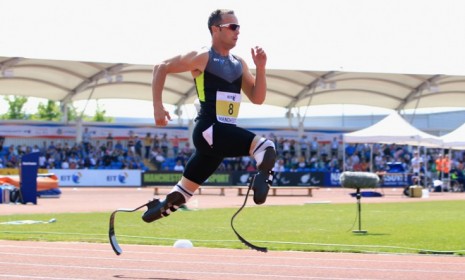London Olympics: Are a double-amputee's bionic legs an unfair advantage?
South Africa's Oscar Pistorius and his J-shaped prosthetic calves will compete against able-bodied Olympians. Is he an inspiration — or a cheat?

A free daily email with the biggest news stories of the day – and the best features from TheWeek.com
You are now subscribed
Your newsletter sign-up was successful
In 2008, South Africa's Oscar Pistorius was barred from competing in the Summer Olympics in Beijing after the International Association of Athletics Federations (IAAF) ruled that the double-amputee runner's prosthetic legs gave him an unfair advantage over his "able-bodied" peers. This year, thanks to a series of last-minute qualifying decisions and a successful appeal before the Court of Arbitration for Sport (CAS), Pistorius and his J-shaped Cheetah Flex-Foot blades will run the 400-meter dash and 4x400 relay at the London Games, making the South African "Blade Runner" the first amputee to race in the Olympics (see him in action in the video below). Did the authorities make the right decision?
Letting Pistorius compete is a mistake: "You can't help but feel like a jerk for saying it," but Pistorius should be barred from the Olympics, says Rick Morrissey in the Chicago Sun-Times. It's unfair that other runners will have to deal with lower-leg fatigue but Oscar won't. And this is a very slippery slope. Pistorius won't win this year, but what happens when science inevitably delivers a prosthetic that lets him or another amputee "run faster, jump higher, or throw farther than able-bodied competitors"?
"It may sound harsh, but Oscar Pistorius shouldn't be allowed..."
The Week
Escape your echo chamber. Get the facts behind the news, plus analysis from multiple perspectives.

Sign up for The Week's Free Newsletters
From our morning news briefing to a weekly Good News Newsletter, get the best of The Week delivered directly to your inbox.
From our morning news briefing to a weekly Good News Newsletter, get the best of The Week delivered directly to your inbox.
Oscar is the star, not his legs: The "anti-enhancement crazies" are wrong to be outraged, says Sally Jenkins in The Washington Post. The idea that Pistorius' prosthetic calves are any more of an advantage than the $10,000 shoes, "hypoxic chambers, wind tunnels, high tech fabrics, and extreme diets" that other elite sprinters rely on is "laughable." What makes Oscar an Olympian is his "emotional gasoline" and "athletic heart, and there is no external way of acquiring it."
"Oscar Pistorius has earned his way into the Olympics"
Pistorius should run, but... : Allowing the "Blade Runner" to compete in London is "a great decision by the International Olympic Committee," but they'd better hope Pistorius "doesn't actually win a medal," says Dan Levy at Bleacher Report. "The Olympic Games have long been as much about the human-interest stories as the actual athletic competitions," and Oscar's will be the "feel-good story of the summer." But if he shocks the world and wins, the story will be tainted by new doubts and accusations about his "advantage."
"Olympic dream for... Pistorius is amazing, as long as he doesn't win"
A free daily email with the biggest news stories of the day – and the best features from TheWeek.com
See Pistorius run: